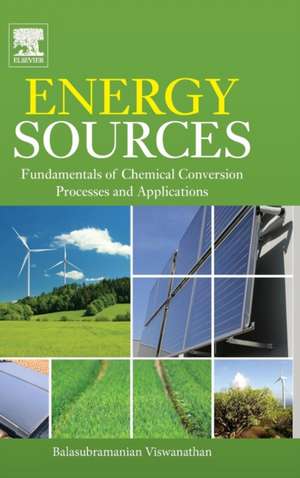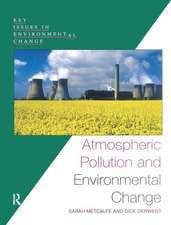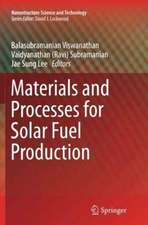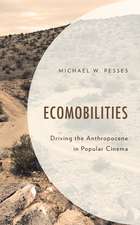Energy Sources: Fundamentals of Chemical Conversion Processes and Applications
Autor Balasubramanian Viswanathanen Limba Engleză Hardback – 30 aug 2016
This book provides the fundamentals behind all energy conversion processes, identifies future research needs, and discusses the potential application of each process in a clear-and-concise manner. It is a valuable source for both chemists and chemical engineers who are working to improve current and developing future energy sources, and is a single reference that deals with almost all energy sources for these purposes, reviewing the fundamentals, comparing the various processes, and suggesting future research directions.
- Compiles, in a single source, all energy conversion processes, enabling easy evaluation and selection
- Explains the science behind each conversion process and facilitates understanding
- Contains many illustrations, diagrams, and tables, enabling a clear and comprehensible understanding of the pros and cons of the various processes
- Includes an exhaustive glossary of all terms used in the conversion processes
- Presents current status and new direction, thus enabling the planning process for future research needs
- Provides a concise and comprehensive overview of all energy sources
Preț: 614.52 lei
Preț vechi: 675.30 lei
-9% Nou
Puncte Express: 922
Preț estimativ în valută:
117.59€ • 123.10$ • 97.30£
117.59€ • 123.10$ • 97.30£
Carte tipărită la comandă
Livrare economică 29 martie-12 aprilie
Preluare comenzi: 021 569.72.76
Specificații
ISBN-13: 9780444563538
ISBN-10: 0444563539
Pagini: 408
Ilustrații: Approx. 100 illustrations
Dimensiuni: 152 x 229 x 43 mm
Greutate: 0.84 kg
Editura: ELSEVIER SCIENCE
ISBN-10: 0444563539
Pagini: 408
Ilustrații: Approx. 100 illustrations
Dimensiuni: 152 x 229 x 43 mm
Greutate: 0.84 kg
Editura: ELSEVIER SCIENCE
Public țintă
Academics and Researchers, graduate students in energy engineering courses, energy technocrats, energy policy makers.Cuprins
1. Energy sources: an introduction2. Petroleum3. Natural gas4. Coal5. Nuclear Fission6. Nuclear fusion7. Batteries8. Fuel cells9. Supercapacitors10. Photovoltaics11. Photoelectrochemical cells12. Hydrogen Production and storage13. Biochemical energy conversions14. Wind energy15. Ocean energy16. Other Renewable forms of energy






















